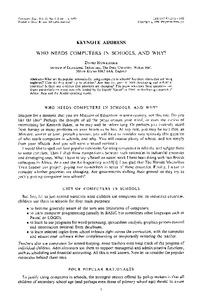Who Needs Computers in Schools, and Why?David Hawkridge
Erstpublikation in: Computers & Education, Volume 15, Issues 1-3, 1990, Pages 1-6
Publikationsdatum:
|
 |
 Diese Seite wurde seit 2 Jahren inhaltlich nicht mehr aktualisiert.
Unter Umständen ist sie nicht mehr aktuell.
Diese Seite wurde seit 2 Jahren inhaltlich nicht mehr aktualisiert.
Unter Umständen ist sie nicht mehr aktuell.
 Zusammenfassungen
Zusammenfassungen
What are the popular rationales for using computers in schools? Are there others that are being
neglected? How do they stand up to criticism? Are they the same in both developing and industrial
countries? Is there any evidence that priorities are changing? This paper addresses these questions and
draws particularly on recent research. funded by the Harold Macmillan Trust, in developing countries of
Africa. Asia and the Arabic-speaking world.
Von David Hawkridge im Text Who Needs Computers in Schools, and Why? (1990) This paper outlines and discusses four rationales for using computers in schools: (1) the social rationale, which states that it is necessary for children to become aware and unafraid of computers in order to prepare for life and work in an industrial society; (2) the vocational rationale, which states that children should learn computer programming and become generally computer literate; (3) the pedagogic rationale, which states that computer assisted instruction offers advantages over other teaching methods in subjects such as physics and art (among many others); and (4) the catalytic rationale, which states that computers help children become less dependent on the teacher as expert and will enable change in education to occur. Three additional rationales are also noted and discussed: the information technology industry rationale, the cost-effectiveness rationale, and the special needs rationale. It is concluded that priorities for using computers in schools are changing rapidly and should be further examined.
Von Klappentext im Text Who Needs Computers in Schools, and Why? (1990)  Dieser Text erwähnt ...
Dieser Text erwähnt ...
 Zitationsgraph (Beta-Test mit vis.js)
Zitationsgraph (Beta-Test mit vis.js)
 1 Erwähnungen
1 Erwähnungen 
- Second Handbook of Information Technology in Primary and Secondary Education (Joke Voogt, Gerald Knezek, Rhonda Christensen, Kwok-Wing Lai) (2018)


- 25. Information and Communication Technology and Education - Meaningful Change Through Teacher Agency (Peter R. Albion, Jo Tondeur)


- 25. Information and Communication Technology and Education - Meaningful Change Through Teacher Agency (Peter R. Albion, Jo Tondeur)
 Volltext dieses Dokuments
Volltext dieses Dokuments
 |  Who Needs Computers in Schools, and Why?: Artikel als Volltext ( Who Needs Computers in Schools, and Why?: Artikel als Volltext ( : :  , 664 kByte; , 664 kByte;  : :  2021-03-21) 2021-03-21) |
 Anderswo suchen
Anderswo suchen 
 Beat und dieser Text
Beat und dieser Text
Beat hat Dieser Text während seiner Zeit am Institut für Medien und Schule (IMS) ins Biblionetz aufgenommen. Beat besitzt kein physisches, aber ein digitales Exemplar. Eine digitale Version ist auf dem Internet verfügbar (s.o.). Aufgrund der wenigen Einträge im Biblionetz scheint er es nicht wirklich gelesen zu haben. Es gibt bisher auch nur wenige Objekte im Biblionetz, die dieses Werk zitieren.










 Biblionetz-History
Biblionetz-History